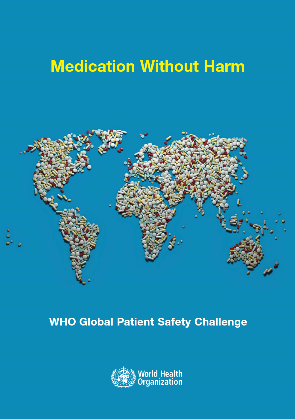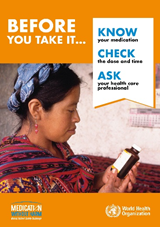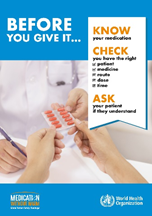WHO Global Safety Challenge: Medication Without Harm

The World Health Organization (WHO) has launched its third global patient safety challenge: Medication Without Harm, which focuses on improving medication safety. The goal of the WHO challenge is to reduce severe, avoidable harm related to medicines by 50% in the next 5 years.
The global challenge aims to encourage and empower patients, their caregivers and healthcare professionals (for example nurses, physicians, pharmacists) to take an active role in ensuring safer medication practices and medication use processes including prescription, preparation, dispensing, administration and monitoring.
The three priority action areas of the challenge are to:
- Improve medication safety at transitions of care (for example, being admitted or discharged from hospital).
-
Reduce the risk in high-risk situations (for example, certain patient groups or certain medicines).
-
Reduce the level of inappropriate polypharmacy (when a person uses a number of medicines on a regular basis including some unnecessary medicines or medicines without a known reason).
In order to meet the challenge the WHO has identified four domains of work:
-
Patients and the public
-
Healthcare professionals
-
Medicines
-
Systems and practices of medication
What can I do?
Medicines are the most commonly used treatment across the health system and therefore most people will take medicines during their lifetime.

Everyone, including patients and healthcare professionals, has a role to play in ensuring medication safety.
The call for action of the global campaign is “KNOW. CHECK. ASK.”
Patients
Patients should check the following before taking their medication:
- KNOW their medication
- CHECK the dose and time
- ASK their pharmacist, or other healthcare professional, if they are unsure
Pharmacists
As medicines experts, pharmacists have a critical role to play in ensuring the safe and rational use of medicines. They are well placed, both in the community and hospital care settings, to educate and advise patients on the correct use of their medicines.

Before medication is given to a patient, the pharmacist or other health professional, should:
KNOW their medication
CHECK that they have the right:
-
Patient
-
Medicine
-
Route
-
Dose
-
Time
ASK the patient if they understand
PSI's Role
The PSI is committed to supporting this important patient safety initiative, and we will add more information to this page for patients and healthcare professionals as the campaign develops.
Patient Charter
We have a Patient Charter to inform the public about what they can expect from a community pharmacist. The purpose of the Patient Charter - You and Your Pharmacist is to:
-
demonstrate the role pharmacists play in assisting people to look after their health
-
inform patients about how they can help their pharmacist to meet the expectations set out in the Patient Charter.
Future Pharmacy Practice Report
The PSI's Report on Future Pharmacy Practice - Meeting Patients’ Needs examines how pharmacy practice in Ireland can meet patients’ needs in the future.
It provides insight into the envisaged role pharmacists should be playing in the context of national strategy, examining how pharmacy practice can progress, improve and most valuably contribute to the health and wellbeing of patients in an evolving healthcare sector.
The report highlights how patients and the pharmacy sector can continue to contribute to public and patient care. It aims to build on the existing good practice and patient trust currently in place, to develop new practices to meet the evolving needs of the patient and the health system of the future.
HSE
The National Medication Safety Improvement Programme, Safermeds, is one of the priority safety programmes within the HSE Quality Improvement Division. Safermeds launched its Know Check Ask campaign on 9 July, and a tool for the public to help improve the safe use of medicines. It will help people take medicines appropriately and everyone involved in their care to make better decisions about their treatment. The campaign invites pharmacists and pharmacies to participate and display campaign resources and engage with people to 'Know Check Ask'. Resources and suggestions on how to maximise the impact of this campaign in a pharmacist's local setting is available on the HSE website. Support is also available by email, safermeds@hse.ie.
Further material to support the WHO Challenge
The World Health Organization has published a wealth of resources including educational materials, reports, patient stories and campaign materials with a video and posters.